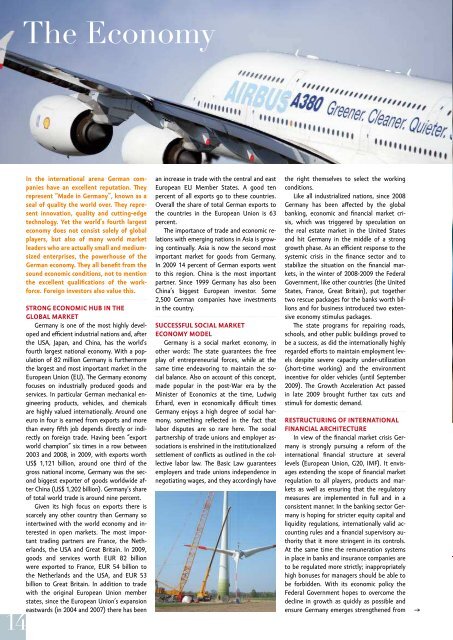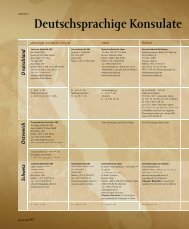Download PDF - discover-middleeast.com
Download PDF - discover-middleeast.com
Download PDF - discover-middleeast.com
You also want an ePaper? Increase the reach of your titles
YUMPU automatically turns print PDFs into web optimized ePapers that Google loves.
The Economy<br />
in the international arena German <strong>com</strong>panies<br />
have an excellent reputation. They<br />
represent “made in Germany”, known as a<br />
seal of quality the world over. They represent<br />
innovation, quality and cutting-edge<br />
technology. yet the world’s fourth largest<br />
economy does not consist solely of global<br />
players, but also of many world market<br />
leaders who are actually small and mediumsized<br />
enterprises, the powerhouse of the<br />
German economy. They all benefit from the<br />
sound economic conditions, not to mention<br />
the excellent qualifications of the workforce.<br />
foreign investors also value this.<br />
stronG economic Hub in tHe<br />
Global marKet<br />
Germany is one of the most highly developed<br />
and efficient industrial nations and, after<br />
the USA, Japan, and China, has the world’s<br />
fourth largest national economy. With a population<br />
of 82 million Germany is furthermore<br />
the largest and most important market in the<br />
European Union (EU). The Germany economy<br />
focuses on industrially produced goods and<br />
services. In particular German mechanical engineering<br />
products, vehicles, and chemicals<br />
are highly valued internationally. Around one<br />
euro in four is earned from exports and more<br />
than every fifth job depends directly or indirectly<br />
on foreign trade. Having been “export<br />
world champion” six times in a row between<br />
2003 and 2008, in 2009, with exports worth<br />
US$ 1,121 billion, around one third of the<br />
gross national in<strong>com</strong>e, Germany was the second<br />
biggest exporter of goods worldwide after<br />
China (US$ 1,202 billion). Germany’s share<br />
of total world trade is around nine percent.<br />
Given its high focus on exports there is<br />
scarcely any other country than Germany so<br />
intertwined with the world economy and interested<br />
in open markets. The most important<br />
trading partners are France, the Netherlands,<br />
the USA and Great Britain. In 2009,<br />
goods and services worth EUR 82 billion<br />
were exported to France, EUR 54 billion to<br />
the Netherlands and the USA, and EUR 53<br />
billion to Great Britain. In addition to trade<br />
with the original European Union member<br />
states, since the European Union’s expansion<br />
eastwards (in 2004 and 2007) there has been<br />
an increase in trade with the central and east<br />
European EU Member States. A good ten<br />
percent of all exports go to these countries.<br />
Overall the share of total German exports to<br />
the countries in the European Union is 63<br />
percent.<br />
The importance of trade and economic relations<br />
with emerging nations in Asia is growing<br />
continually. Asia is now the second most<br />
important market for goods from Germany.<br />
In 2009 14 percent of German exports went<br />
to this region. China is the most important<br />
partner. Since 1999 Germany has also been<br />
China’s biggest European investor. Some<br />
2,500 German <strong>com</strong>panies have investments<br />
in the country.<br />
successful social marKet<br />
economy model<br />
Germany is a social market economy, in<br />
other words: The state guarantees the free<br />
play of entrepreneurial forces, while at the<br />
same time endeavoring to maintain the social<br />
balance. Also on account of this concept,<br />
made popular in the post-War era by the<br />
Minister of Economics at the time, Ludwig<br />
Erhard, even in economically difficult times<br />
Germany enjoys a high degree of social harmony,<br />
something reflected in the fact that<br />
labor disputes are so rare here. The social<br />
partnership of trade unions and employer associations<br />
is enshrined in the institutionalized<br />
settlement of conflicts as outlined in the collective<br />
labor law. The Basic Law guarantees<br />
employers and trade unions independence in<br />
negotiating wages, and they accordingly have<br />
the right themselves to select the working<br />
conditions.<br />
Like all industrialized nations, since 2008<br />
Germany has been affected by the global<br />
banking, economic and financial market crisis,<br />
which was triggered by speculation on<br />
the real estate market in the United States<br />
and hit Germany in the middle of a strong<br />
growth phase. As an efficient response to the<br />
systemic crisis in the finance sector and to<br />
stabilize the situation on the financial markets,<br />
in the winter of 2008-2009 the Federal<br />
Government, like other countries (the United<br />
States, France, Great Britain), put together<br />
two rescue packages for the banks worth billions<br />
and for business introduced two extensive<br />
economy stimulus packages.<br />
The state programs for repairing roads,<br />
schools, and other public buildings proved to<br />
be a success, as did the internationally highly<br />
regarded efforts to maintain employment levels<br />
despite severe capacity under-utilization<br />
(short-time working) and the environment<br />
incentive for older vehicles (until September<br />
2009). The Growth Acceleration Act passed<br />
in late 2009 brought further tax cuts and<br />
stimuli for domestic demand.<br />
restructurinG of international<br />
financial arcHitecture<br />
In view of the financial market crisis Germany<br />
is strongly pursuing a reform of the<br />
international financial structure at several<br />
levels (European Union, G20, IMF). It envisages<br />
extending the scope of financial market<br />
regulation to all players, products and markets<br />
as well as ensuring that the regulatory<br />
measures are implemented in full and in a<br />
consistent manner. In the banking sector Germany<br />
is hoping for stricter equity capital and<br />
liquidity regulations, internationally valid accounting<br />
rules and a financial supervisory authority<br />
that it more stringent in its controls.<br />
At the same time the remuneration systems<br />
in place in banks and insurance <strong>com</strong>panies are<br />
to be regulated more strictly; inappropriately<br />
high bonuses for managers should be able to<br />
be forbidden. With its economic policy the<br />
Federal Government hopes to over<strong>com</strong>e the<br />
decline in growth as quickly as possible and<br />
ensure Germany emerges strengthened from<br />
→<br />
www.healthcapital.de<br />
The pulse of life.<br />
The Health Capital Region<br />
Berlin Brandenburg<br />
Arab Health 2012, Zabeel Hall, Booth ZE19<br />
The joint Berlin-Brandenburg stand at the “Arab Health 2012” exhibition and the business presentation in Dubai are funded by the<br />
State of Berlin and co-financed by the European Union via the European Regional Development Fund (ERDF). Invest in your future!






